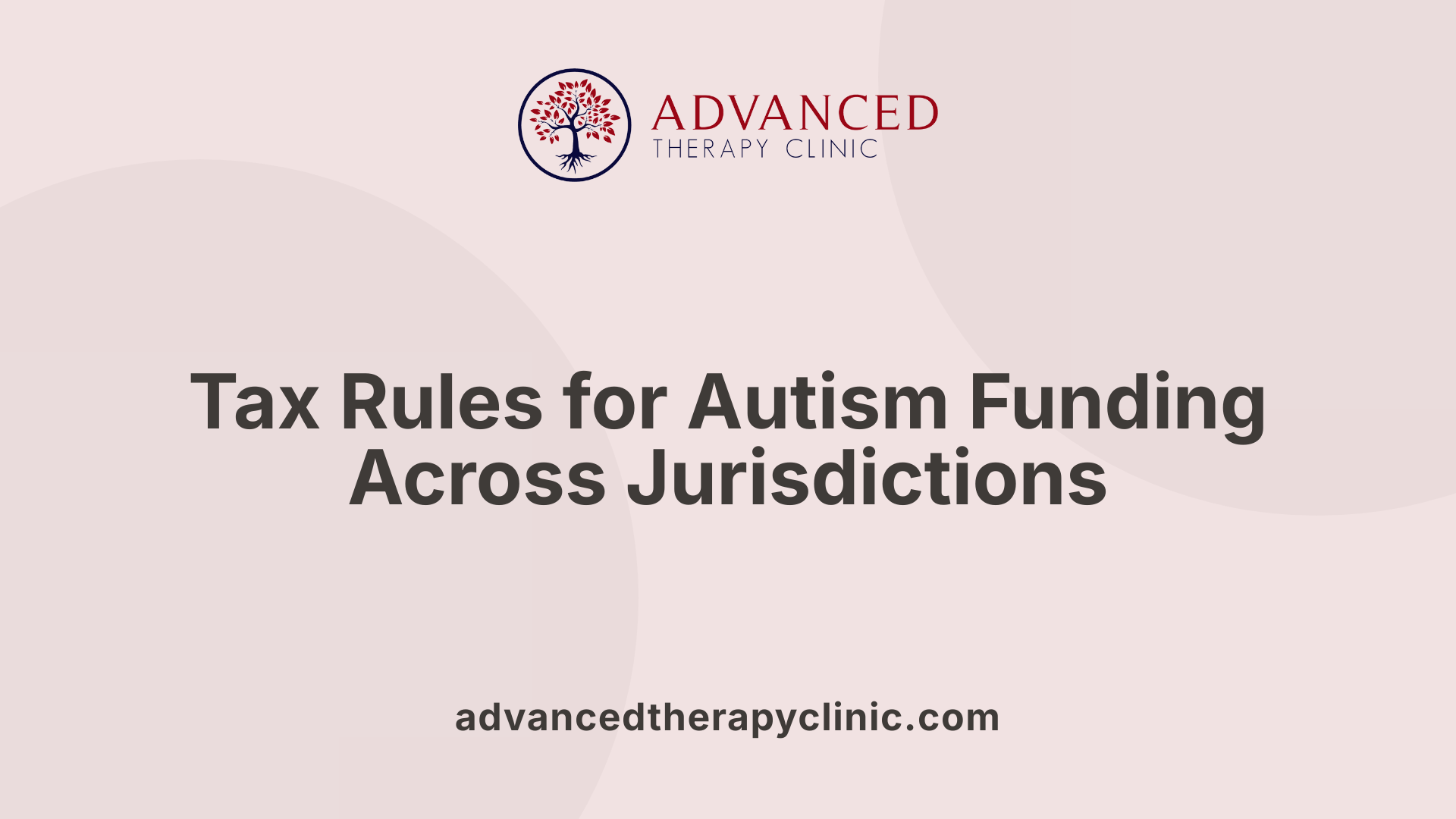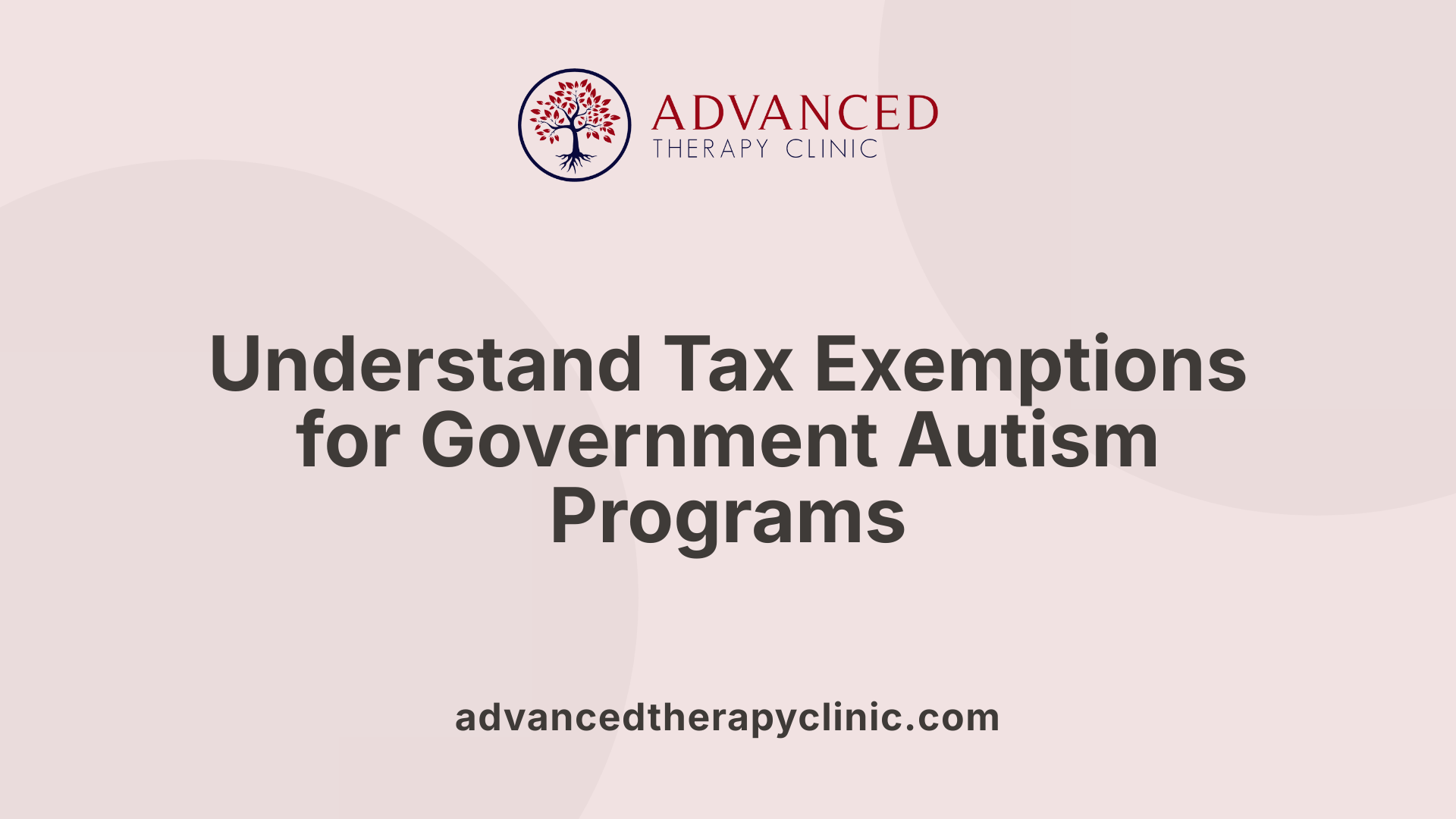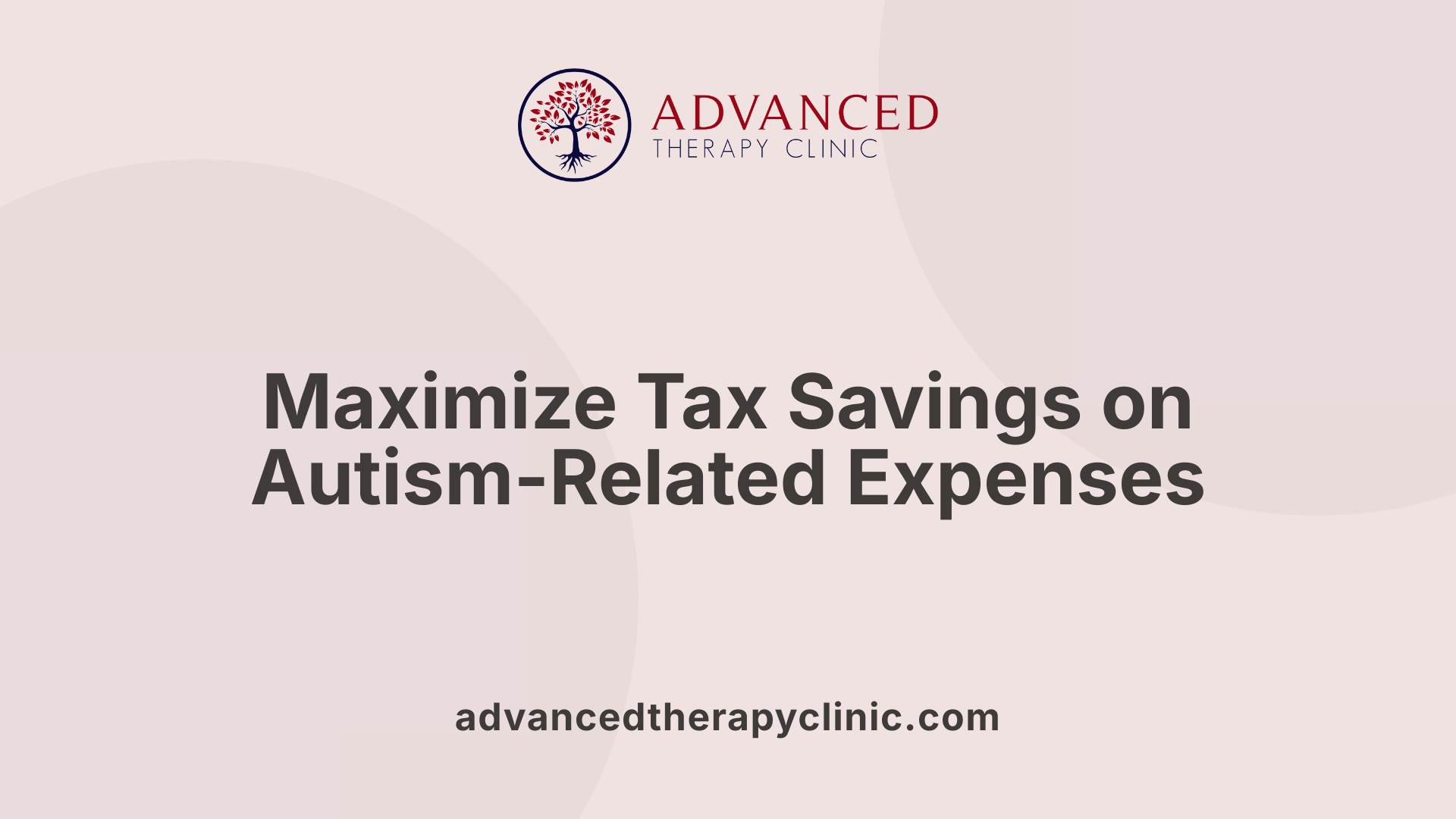Is Autism Funding Taxable


Decoding Tax Rules for Autism Support
Autism funding and related supports are vital resources for families and individuals navigating the spectrum. Given the complexity of tax laws, many wonder whether these funds are taxable and how they impact eligibility for other benefits. This article explores various funding sources, government programs, and insights from trustworthy sources to clarify the tax treatment of autism-related financial assistance.
Taxability of Autism Funding and Support in Different Jurisdictions

Is autism funding considered taxable income?
The tax treatment of autism funding varies depending on the source and the jurisdiction. In many cases, government-supported autism programs and benefits are not classified as taxable income. For example, in Canada, programs like the Ontario Autism Program (OAP) provide financial support and clinical services that are generally not taxable. Similarly, in the United States, federal disability benefits as provided by the Social Security Administration typically are not taxable.
However, the specifics can differ depending on how the funding is provided. Private grants, donations, or savings plans might have distinct tax implications. For instance, contributions to the Registered Disability Savings Plan (RDSP) in Canada are not taxed when withdrawn, but the growth within the plan is tax-deferred. In the US, certain support payments or private funds may need to be reported as income.
Given these variations, families and individuals receiving autism-related support should consult with a tax professional or review local tax laws. Understanding whether funding needs to be reported as income and how to handle deductions or credits is crucial to managing their finances effectively.
Differences in tax treatment across regions
Tax policies regarding autism funding differ significantly across regions. In Ontario, the Autism Assistance Fund and other supports like the Ontario Autism Program are considered non-taxable benefits. Meanwhile, in Saskatchewan, funding such as ASD-IF is also non-taxable and does not need to be reported as income.
In the United States, though some benefits and supports are exempt from federal taxes, certain benefits or employment-related supports could have different rules at the state level or if received through private channels. The U.S. Department of Education and Social Security programs primarily support services and benefits that are not taxable.
In Canada, the Disability Tax Credit, RDSP, and government grants are structured to provide financial aid without increasing taxable income. These programs are designed to support long-term financial security while remaining tax-advantaged.
Implications for families and individuals
Understanding the tax implications of autism support and funding is essential for effective financial planning. If benefits are considered non-taxable, families can maximize their use without concern about additional tax liabilities. However, if certain income or benefits are taxable, it may affect eligibility for other assistance programs or influence overall income reported.
Families should keep detailed records of all autism-related expenses and funding received. Proper documentation ensures accurate reporting and helps in claiming eligible deductions, credits, or exemptions. Consulting with financial advisors or tax experts helps navigate complex regulations and optimize benefits.
By understanding the variations and requirements, families can make informed decisions and better plan for ongoing supports, services, and long-term financial stability.
| Region | Typical Tax Treatment of Autism Funding | Examples of Supported Programs | Notes on Implications |
|---|---|---|---|
| Canada | Generally non-taxable, tax-advantaged plans like RDSP | Ontario Autism Program, Disability Tax Credit, RDSP grants | Supports long-term savings and benefits |
| United States | Usually non-taxable federal benefits; private sources vary | Social Security Disability Benefits, employment supports | Check state-specific rules and private grants |
| Province-specific | Similar to national policies, benefits are non-taxable | Saskatchewan ASD-IF, Ontario Autism Services | Important for local planning |
This overview highlights the importance of verifying local tax laws regarding autism-related funding. While many programs aim to be tax-efficient, consulting professionals ensures proper compliance and maximizes available benefits.
Tax Treatment of Government Programs and Grants for Autism

How are government programs and grants for autism taxed?
Most government programs and grants aimed at supporting individuals with autism are not considered taxable income. For example, benefits like Supplemental Security Income (SSI), Social Security Disability Insurance (SSDI), and Medicaid waivers typically have a tax-exempt status. Funds received through specialized accounts, such as ABLE accounts designed for disability-related expenses, are also generally tax-free when used for qualified costs.
These supports cover a range of services, including therapy, employment support, and medical expenses. In addition, government-funded programs like Ontario’s Autism Funding and the Disability Tax Credit often fall outside taxable income, easing the financial burden on families.
However, there are exceptions depending on local laws and the specific funding arrangements. Income or benefits that don't have an explicit tax-exempt designation might be subject to taxation, especially if they are considered income rather than grants or benefits.
It’s essential for families and individuals to seek personalized advice from a tax professional. They can clarify how the benefits they receive—such as grants, stipends, or savings plans—are taxed under their jurisdiction's laws.
In summary, the majority of autism-related financial supports in the U.S. and Canada are tax-exempt, helping families access necessary resources without added tax burdens. Nevertheless, specific circumstances may vary, making professional guidance vital to ensure compliance and optimize benefits.
Disability Benefits and Their Tax Status

Are disability benefits related to autism taxable?
Disability benefits received specifically because of autism, such as Social Security Disability Insurance (SSDI) and Supplemental Security Income (SSI), are typically not taxable. These programs aim to support individuals with disabilities by providing essential financial assistance without adding to their taxable income.
However, the tax treatment can vary depending on the source of the benefits. For example, some disability retirement benefits or payments received through other programs might be considered earned income and could be taxed accordingly. It’s important for recipients to understand the nature of their specific benefits.
In addition to direct benefits, many expenses related to autism can be deducted from taxes if they meet IRS criteria. These include diagnostics, therapies, home modifications for accessibility, and specialized equipment. To qualify, these expenses must be itemized medical expenses that exceed 7.5% of the individual’s adjusted gross income.
Other deductible costs may encompass travel to medical appointments, educational tools, and training costs for special education or support services. For example, private tutoring recommended by a doctor for a child with severe learning disabilities can be deducted.
Overall, most disability benefits associated with autism are not taxable, which offers financial relief. Nevertheless, it is advisable to consult IRS regulations or a tax professional to understand personal circumstances fully and to correctly report income and deductions. Staying informed ensures proper tax planning and maximizes eligible deductions for disability-related expenses.
Tax Benefits, Credits, and Deductions for Autism and Disability Support
 Several financial benefits are available to support individuals with autism and other disabilities through the tax system. One of the main benefits includes deductions for qualified out-of-pocket expenses related to medical care, therapies, special education, and home modifications. Families can deduct expenses such as specialized treatments, assistive devices, transportation to medical appointments, and modifications like ramps or widened doorways, provided these expenses primarily serve medical purposes.
Several financial benefits are available to support individuals with autism and other disabilities through the tax system. One of the main benefits includes deductions for qualified out-of-pocket expenses related to medical care, therapies, special education, and home modifications. Families can deduct expenses such as specialized treatments, assistive devices, transportation to medical appointments, and modifications like ramps or widened doorways, provided these expenses primarily serve medical purposes.
In addition to deductions, various tax credits can reduce the overall tax burden for qualifying families. These include the Child Tax Credit, Earned Income Tax Credit (EITC), and education-related credits. Families supporting children with disabilities may also qualify for the Disability Tax Credit (DTC) in Canada, which reduces income tax payable for individuals with severe impairments, and can open access to Registered Disability Savings Plans and other benefits.
Other benefits like Social Security Disability Insurance (SSDI) and disability retirement benefits might be considered earned income for tax purposes, potentially affecting eligibility for credits such as the EITC. Parents supporting a child with a disability can also claim the child as a dependent, which may enhance their tax credits and deductions.
It is highly recommended to consult IRS publications, especially Publication 907, and seek advice from tax professionals to maximize available benefits. Proper documentation of expenses and understanding the specific eligibility criteria are crucial to benefit from these programs effectively.
Impacts of Autism-Related Expenses and Savings Plans on Taxes

What are the tax implications of autism-related expenses and benefits?
Managing expenses associated with autism can have notable tax advantages. Families often incur various costs such as medical treatments, therapies, home modifications, and travel to appointments. Many of these qualify as medical deductions, which can be claimed if they exceed 7.5% of the family's Adjusted Gross Income (AGI). This includes expenses for specialized schooling, assistive devices, and service animals.
In addition to deductions, there are specific savings plans designed to support families financially. The Disability Tax Credit (DTC) offers a non-refundable tax credit for individuals with severe and prolonged impairments, reducing overall income tax. Government programs like the Registered Disability Savings Plan (RDSP) provide long-term savings options, with government grants matching contributions to help build financial resources.
Specific accounts, such as ABLE accounts, allow for tax-free distributions when used for qualified disability expenses. While contributions to ABLE accounts are not tax-deductible at the federal level, earnings grow tax-free, and withdrawals for eligible expenses are tax-free. These plans collectively assist families in managing costs effectively.
Moreover, families can benefit from various tax credits like the Child Tax Credit and Child and Dependent Care Credit, which help offset the financial load. Travel expenses for medical care, legal expenses for securing educational services, and home modifications may also be deductible if they are primarily for medical or disability-related reasons.
Overall, these tax advantages are crucial tools that enhance financial planning for families navigating autism care. Consulting with eligible tax professionals ensures families maximize their benefits while maintaining compliance with applicable laws.
Navigating the Tax Landscape for Autism Support
Understanding the tax implications of autism funding and related benefits is crucial for families and individuals. Most government-funded programs and disability benefits are non-taxable, and various deductions and credits are available to help offset expenses. Savings plans like ABLE accounts and DTC offer significant tax advantages, supporting long-term financial planning. However, given the complexity of tax laws and regional variations, consulting a tax professional is highly recommended to ensure that recipients maximize their benefits while remaining compliant with applicable regulations. Staying informed and organized with receipts, documentation, and understanding the specifics of each funding source can greatly enhance financial management for those navigating autism-related support.
References
- ABLE Accounts - The Autism Community in Action
- Potential income tax benefits for families with special needs children
- How much funding is available - Province of British Columbia
- Disability tax credit (DTC) - Canada.ca
- How Do I Pay for Autism Services in Ontario?
- Ontario Autism Program: guidelines for core clinical services and ...
- [PDF] Autism Spectrum Disorder (ASD) Individualized Funding FAQs
Recent articles

What to Expect at Your First Therapy Session
Discover what your child’s first therapy session looks like, from rapport building to goal setting, and how families can feel confident starting care.

Celebrating Small Wins: How Therapy Helps Kids Build Confidence All Year Long
Learn why small wins in therapy matter, how they boost your child’s confidence, and simple ways families can celebrate progress all year long.

Empowering Missoula Children to Grow With Confidence and Connection
Learn how ABA therapy in Missoula helps children build communication, independence, and confidence through personalized, family‑centered support at Advanced Therapy Clinic.

Compassionate Pediatric Therapy in Butte, Montana
A welcoming place where every child’s potential is celebrated

How Pediatric Therapy Helps Kids Thrive across Montana and Wyoming
A supportive guide for families exploring therapy options in Billings, Butte, Missoula or Sheridan.

How to Choose the Right Pediatric Therapy Clinic in Billings, Montana
A Parent‑Friendly Guide To Finding The Best Support For Your Child

